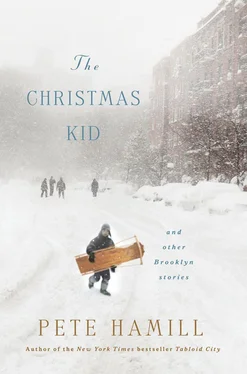Then one Saturday afternoon in late August, as the skies darkened with the threat of a storm, Shawn arrived from the roof. Marilyn was in her pink bathrobe. The exercise mat was draped over a chair. There was an urgency in her eyes, and then in her voice.
“Let’s go up the roof,” she said.
“It’s blowing hard up there,” he said. “Someone at the store said there might even be a hurricane.”
“I know,” she said, and grabbed the mat and led the way to the roof.
She laid the mat on the roof and told him to get undressed.
“Here? What if—”
“In this storm, Shawnie, nobody’s heading for the roof.”
The first fat drops of rain began to fall. Trembling with urgency, Shawn pulled his shirt over his head and tossed it away. Marilyn removed her bathrobe and laid it upon the mat. She was naked. Then she kneeled, her body trembling, her arms stretched to Shawn. He squatted beside her. They kissed gently. She pulled away and smiled.
Then the rain came at them angrily, in huge, powerful drops, and they lay out flat, side by side, holding hands, facing the angry sky. Rain poured upon their bodies as they surrendered to the howling power of the storm. And then it changed to hail. Small, fierce pellets of ice. Like shrapnel. The waves of hailstones hammered the rooftops, creating a wordless roar. Shawn turned to protect her body with his own. He heard her making sounds, but not words, held her hair with both hands, kissed her fiercely, felt her amazing warmth, while the endless rounds of ice stabbed at his own flesh.
Then she pulled away from his mouth, her eyes closed, and he heard her high-pitched voice, rising into the roar of the storm. Screaming one long extended name.
Shaaaaaawneeee…Oh, Shaaaaaaawnneeeeee…
He woke late on Sunday morning. Flashes of the storm scribbled through his mind, and he rose, dressed quickly, gazed out the window, and saw that the storm was finished and gone. He quickly prepared some cornflakes and a sliced banana for Uncle Jimmy. And headed to the roof. The door to her house was locked from inside. He went home, then downstairs, and hurried to 11th Street. A small battered moving van was being stuffed with furniture that he knew. Chairs and a couch and cardboard boxes heavy with books. His heart was pounding as he entered the open front door and hurried up to Marilyn Carter’s top-floor apartment.
She was not there.
“She left this morning,” one of two burly moving men said. “Early. Said she had to go someplace. Already paid us, plus the tip.”
“Where are you taking her stuff?”
“Somewhere in Jersey,” the man said with a shrug.
Shawn turned away. He went down the stairs slowly, then out into the street. He noticed bands of small kids scampering in all directions, splashing puddles beside the curbs. Trash cans were overturned on every corner. A tree had fallen on 11th Street, its smashed limbs now blocking traffic. He counted three wrecked umbrellas outside the grocery store. A flowerpot had been blown off a fire escape. Yes, Shawn thought: there really had been a storm. He didn’t dream it.
For more than an hour, he walked around the neighborhood, looking at damage, and trying to make his mind blank and empty. Like the mind of Uncle Jimmy. Men waited for the corner bars to open. He saw a crowd outside Saint Stanislaus Martyr church on 14th Street, but he did not go in. He saw a fallen tree that had crushed the top of a car. When he arrived home, Uncle Jimmy was facing the TV set, with the sound turned off. Shawn told him he was going up the roof.
When he stepped out the door, he saw that the old pigeon coop was smashed flat. Some clotheslines were down. Then he looked the other way, toward her rooftop. He saw something pink and his heart stopped. He hurried to the small, soaked bundle jammed against the base of a chimney and lifted it. He shook the bathrobe open, and then held it to his chest. Then, at last, he began to weep.
CARMODY CAME UP FROM the subway before dusk, and his eyeglasses fogged in the sudden cold. He lifted them off his nose, holding them while they cooled, and saw his own face smiling back at him from a pale green leaflet taped to the wall. There he was, in a six-year-old photograph, and the words READING and BOOK SIGNING and the date and place, and he paused for a moment, shivering in the hard wind. The subway was his idea. The publisher could have sent him to Brooklyn in a limousine, but he wanted to go to the old neighborhood the way he always did, long ago. He might, after all, never come this way again.
The subway stairs seemed steeper than he remembered and he felt twinges in his knees that he never felt in California. Sharp little needles of pain, like rumors of mortality. He didn’t feel these pains after tennis, or even after speed-walking along the Malibu roads. But the pain was there now, and was not eased by the weather. The wind was blowing fiercely from the harbor, which lay off in the darkness to his right, and he donned his glasses again and used both gloved hands to pull his brown fedora more securely to his brow. His watch told him that he had more than a half hour to get to the bookstore. Just as he had hoped. He’d have some time for a visit, but not too much time. He crossed the street with his back to the bookstore that awaited him and passed into the streets where he once was young.
His own face peered at him from the leaflets as he passed, some pasted on walls, others taped inside the windows of shops. In a way, he thought, they looked like “Wanted” posters. He felt a sudden…what was the word? Not fear. Certainly not panic. Unease. That was the word. An uneasiness in the stomach. A flexing and then relaxing of muscles, an unwilling release of liquids or acids, all those secret wordless messages that in California were cured by the beach and the surf or a quick hit of Maalox. He told himself to stop. This was no drama. It was just a trip through a few streets where once he had lived but that he had not seen for decades. After seventeen novels, this would be his first signing in the borough that had formed him. But the leaflets made clear that here, in this neighborhood, his appearance was some kind of big deal. It might draw many people. And Carmody felt apprehensive, nervous, wormy with…unease.
“How does it feel, going back to Brooklyn?” Charlie Rose had asked him the night before, in a small dark television studio on Park Avenue.
“I don’t know,” Carmody said, and chuckled. “I just hope they don’t throw books at me. Particularly my own books.”
And wanted to add: I’ve never really left. Or, to be more exact: those streets have never left me.
The buildings themselves along the avenue were as Carmody remembered them. They were old-law tenements, with fire escapes on the facades, but they seemed oddly comforting to Carmody. This was not one of those New York neighborhoods desolated by time and arson and decay. He had seen photographs of the enrubbled lots of Brownsville and East New York. There were no lots here in the old neighborhood. If anything, the buildings looked better now, with fresh paint and clear glass instead of hammered tin on the street-level doors. He knew from reading the New York Times that the neighborhood had been gentrified, that most of the old families had moved away, to be replaced by younger people who paid much higher rents. There was some unhappiness to all of that, the paper said, but still, the place looked better. As a boy he had walked these streets many times on evenings like this, when most people retreated swiftly from the bitter cold to the uncertain warmth of the flats. Now he noticed lights coming on in many of those old apartments, and shadows moving like ghosts behind drawn shades and curtains. He peered down a street toward the harbor and saw a thin scarlet band where the sun was setting in New Jersey. That was the same, too. The day was dying. It would soon be night.
Читать дальше












